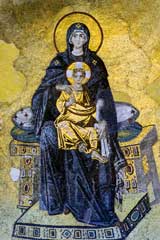An ecumenical council (or ecumenical council; also general council) is a conference of the bishops of the whole Christian Church convened to discuss and settle matters of Church doctrine and practice.
The Acts of the Apostles records the Council of Jerusalem in 49 (Acts 15, 1-31): Nobody is justified by the works of the law but through faith in Jesus Christ: " We have believed in Christ Jesus, in order to be justified by faith in Christ, and not by works of the law, because by works of the law shall no one be justified" (Ga 2, 16).
The first seven Ecumenical Councils
1. First Council of Nicaea (325): We believe "in one Lord Jesus Christ, the Son of God, begotten of the Father (the only-begotten); that is, of the essence of the Father, God of God, Light of Light, very God of very God, begotten, not made, being of one substance with the Father" (Creed of Nicaea).
2. First Council of Constantinople (381) : We believe "in the Holy Ghost, the Lord and Giver of life, who proceedeth from the Father, who with the Father and the Son together is worshiped and glorified, who spoke by the prophets" (Creed of Constantinople).
3. Council of Ephesus (431): Mary is the Mother of God.
4. Council of Chalcedon (451): Jesus is true God and true man.
5. Second Council of Constantinople (553): Jesus is an only Person with a dual nature (divine and human).
6. Third Council of Constantinople (680) Christ Jesus has two wills: divine and human. Jesus said indeed: "I seek not my own will but the will of him who sent me" (His Father) (John 5, 30).
7. Second Council of Nicaea (787): The Christian veneration of images is not contrary to the first commandment which proscribes idols. Indeed, "the honor rendered to an image passes to its prototype," and "whoever venerates an image venerates the person portrayed in it." The honor paid to sacred images is a "respectful veneration," not the adoration due to God alone.
During the second millennium two councils of the Roman Catholic Church were very important:
The council of Trente (Italy) (1545-1563) is the council of the catholic reform.
The council Vatican 2 is the most recent Council (1962-1965). Several texts are very important (freedom of religion, link with Judaism, ecumenism, human dignity...).
The Theotokos (Mother of God), Hagia Sophia in Constantinople
(Istanbul)
